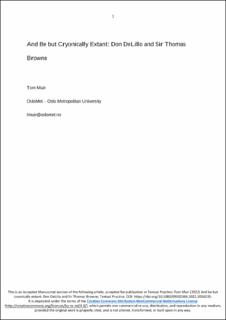And be but cryonically extant: Don DeLillo and Sir Thomas Browne
Peer reviewed, Journal article
Accepted version
Permanent lenke
https://hdl.handle.net/11250/3052500Utgivelsesdato
2022-04-04Metadata
Vis full innførselSammendrag
This paper argues that Don DeLillo’s 2016 novel Zero K uses a debt to Sir Thomas Browne to stage a scalar approach to literature in the Anthropocene. Zero K uses its intertextual relationship to Browne’s Urne-Buriall to subject not only itself but the institution of literature per se to a kind of radical reduction or minimisation, cancelling out both against the scale of geological time. DeLillo’s novel can be seen as echoing the process of ‘agitation’ Brent Nelson finds in Urne-Buriall, pulling the reader back and forth between the time of the novel and geological time; in so doing, it responds to questions foregrounded by – among others – Timothy Clark and Timothy Morton about the anthropocentric limits of the novel in the Anthropocene. The present article pursues three aspects of Zero K to make this argument: Jeffrey Lockhart’s compulsion to find meaning in moments (which echoes the attention of Clark and Morton to Wordsworth’s ‘spots of time’); Jeffrey’s sense of Artis Martineau speaking a ‘shadow language,’ which works to withdraw certainty from the present; and a literary fascination with immortality (continuing Browne’s insistence on the transience of monuments). The paper concludes with a brief coda on periodisation and pedagogy.

